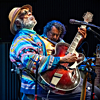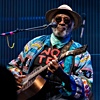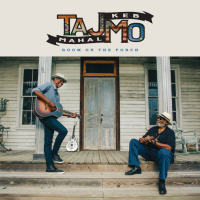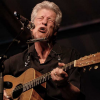Home » Jazz Musicians » Taj Mahal
Taj Mahal
Taj Mahal has spent more than 40 years exploring the roots and branches of the blues. Grounded in the acoustic pre-war blues sound but drawn to the eclectic sounds of world music, he revitalized a dying tradition and prepared the way for a new generation of blues men and women. While many African Americans shunned older musical styles during the 1960s, Mahal immersed himself in the roots of his past. "I was interested in the music because I felt something [got] lost in that transition of blacks trying to assimilate into society." He had no intention of repeating what had come before, however, and drew deeply from the wells of the ethnic music of Africa, South America, and the Caribbean.
Taj Mahal was born Henry Saint Claire Fredericks in New York City in 1942. His father, who had emigrated from the Caribbean, wrote arrangements for Benny Goodman and played piano. His mother, Mildred Shields, had taught school in South Carolina. "Even though I have Southern and Caribbean roots, my background also crossed with indigenous European and African influences," Mahal told Down Beat. "My parents introduced me to gospel, spiritual singing, to Ella, Sarah, Mahalia Jackson, Ray Charles." Mahal also listened to music from around the world on his father's short-wave radio, and developed a love for blues artists like Leadbelly and Lightnin' Hopkins, and early rock-n-rollers like Chuck Berry and Bo Diddley.
Mahal's family moved when he was a young boy and he grew up in Massachusetts. Growing up in Springfield, Mass., Mahal was a rarity--"a young African American who immersed himself in the study of his cultural heritage. At age 11 he witnessed the death of his father in a farming accident, but he found solace in music. When his mother remarried, he discovered his stepfather's guitar in the basement and learned to play it with a broken comb. He also took lessons from Lynnwood Perry and absorbed the radio sounds of jazz players like Illinois Jacquet and Ben Webster. Although he is primarily known as a guitarist, Mahal mastered an arsenal of instruments including piano, banjo, mandolin, and harmonica.
Mahal studied agriculture and animal husbandry at the University of Massachusetts. A dream inspired him to change his name from Fredericks, and he formed Taj Mahal and the Elektras in the early 1960s. He was lucky enough to have his ideas coincide with the '60s and the resurgence of the blues. He attended the Newport Folk Festival in the early 1960s to witness the folk and blues revival first hand. The opportunity to watch traditional blues players perform and meet the artists in person reinforced his decision to play acoustic guitar.
Read moreTags
Taj Mahal Quartet At Miner Auditorium

by Steven Roby
Taj Mahal Quartet Miner AuditoriumSan Francisco, CA August 16, 2025 The sold-out Sunday afternoon performance closed a four-concert SFJAZZ residency with a reminder that Taj Mahal keeps tradition not just intact, but in motion. The 83-year-old bandleader entered to Bunji Garlin's “Differentology (Ready for the Road)," clapping in a straw hat and patterned jacket, then settled amid a semicircle of instruments--three guitars, a six-string banjo, and an eight-string ukulele. “We're the musicians, you're the audience...we are both here ...
Continue ReadingTaj Mahal at SFJAZZ

by Ronald Davis
A collection of photos from the Taj Mahal concert at SFJAZZ Summer Session Series in San Francisco on August 16, 2025 featuring Taj Mahal and his band. ...
Continue ReadingTaj Mahal & Keb' Mo': Room On The Porch

by Frank Housh
In 2017 blues legend Taj Mahal and Keb' Mo' recorded TajMo, (Concord Records), which won the Grammy for Best Contemporary Blues Album. Eight years later, the two follow up with Room On The Porch, released May 23, 2025, also on Concord Records. Its ten tracks feel like a cool dive into a swimming hole, long forgotten by the crowds posing by the hotel pool. The album begins with the title song's shuffling welcome. Taj Mahal said, “That started ...
Continue ReadingTaj Mahal: The Blues Is Eternal

by Doug Collette
Over the course of his fifty-plus years of active musicology, Taj Mahal has explored all manner of roots music, but he always returns to his main influences in the blues. His delving into reggae and Caribbean styles has not only illuminated the links connecting the genres, but also increasingly honed a feel for sharp musicianship that was ever-so-incisive to begin with on his eponymous debut album in 1968 for Columbia Records. A pair of successive albums from the man born ...
Continue ReadingTaj Mahal: Savoy

by Steve Yip
Folk/blues practitioner Taj Mahal's Savoy is to be savored. As one of the custodians of the blues, Mahal has long been a legend in his own time. This collection traverses a cultural-musical continuum in an indispensable residency in the annals of Black American music. The namesake of this album--the Savoy on Lenox Avenue in Harlem--was known as The World's Finest Ballroom and Home Of Happy Feet. In the pre-Civil Rights era, the North claimed formal equality, but segregation ...
Continue ReadingTaj Mahal: Savoy

by Dave Linn
Savoy, from Taj Mahal, is the latest entrant in the crowded field of pop music artists trying their hand at the fertile songbook of old big-band, swing-era standards. Unlike most, Mahal's roots show he's well suited to the task. He was born in Harlem in 1942. He grew up in a musical family, and his parents were both involved in the arts. His father was a jazz pianist and arranger, working with Cab Calloway, Duke Ellington, and Fletcher Henderson among ...
Continue ReadingRy Cooder and Taj Mahal: Get on Board: The Songs Of Sonny Terry & Brownie McGhee

by Nenad Georgievski
There is an African proverb that says “If you want to go fast, go alone. If you want to go far, go together." The intimacy and the dynamics of the duet setting have long appealed to virtuoso guitarist Ry Cooder. During his expansive six decade career, he has released several adventurous duets and collaborative albums with luminaries such as guitarist Ali Farka Toure, Vishwa Mohan Bhatt or Manuel Galban, to name but a few. Get on Board is ...
Continue ReadingTaj Mahal To Headline On Opening Night June 21 At Rochester International Jazz Festival

Source:
Dalmath Associates Inc.
The CGI Rochester International Jazz Festival is proud to present legendary blues guitarist, Taj Mahal, on the Festival's opening night Friday, June 21, at 8 a.m. at Kodak Hall at Eastman Theatre. The Festival's 21st Edition will be held June 21 to 29 at 20 indoor and outdoor venues in downtown Rochester, New York. Tickets for Taj Mahal are $93 / $83 / $63 / $43 plus service charges and go on sale Friday, February 16 at 10 a.m. only ...
read more
Interschool Orchestras Of New York Presents Its Gala Celebration: A Tribute To Howard Johnson on September 18th at Kaufman Music Center’s Merkin Hall

Source:
All About Jazz
InterSchool Orchestras of New York (ISO) is proud to announce its 2019-2020 gala celebration, A Tribute to Howard Johnson, at Kaufman Music Center’s Merkin Hall, September 18, 2019 at 7:30 pm. The special event will honor the musical legend, who, in his five-decade career, has played alongside luminaries in multiple genres and pioneered the voice of the tuba in jazz. The event will also feature the talents of two-time Grammy-winning musician Taj Mahal and students of ISO. All proceeds from ...
read more
Tribute To Howard Johnson At Merkin Hall On September 18th Featuring Taj Mahal And More! Presented By The Interschool Orchestras Of New York!

Source:
Scott Thompson Public Relations
InterSchool Orchestras of New York Presents Its Gala Celebration: A TRIBUTE TO HOWARD JOHNSON Featuring Taj Mahal, Gravity, The Levon Helm Horns, the Beartones, and Students of InterSchool Orchestras of New York InterSchool Orchestras of New York (ISO) is proud to announce its 2019-2020 gala celebration, A Tribute to Howard Johnson, at Kaufman Music Center's Merkin Hall, September 18, 2019 at 7:30 pm. The special event will honor the musical legend, who, in his five-decade career, has played alongside luminaries ...
read more
Robert Johnson Tribute: Roots, Taj Mahal, Keb' MO', Todd Rundgren

Source:
JamBase
ALL-STAR ROBERT JOHNSON CENTENNIAL TRIBUTE CONCERT CONFIRMED FOR MARCH 6 AT THE APOLLO THEATER Producers announced today the first artists confirmed to play a special March 6 tribute concert at NY's historic Apollo Theater, celebrating the centennial of legendary bluesman Robert Johnson. The initial, star-studded lineup includes The Roots, Shemekia Copeland, Bettye LaVette, Taj Mahal, Keb' Mo,' Sam Moore and Todd Rundgren, with more to be announced soon. Net proceeds from the concert, co-produced by Steve Berkowitz, Michael Dorf, Joe ...
read more
Taj Mahal, Me'shell Ndegeocello, Others - 30th Annual John Lennon Tribute (2011)

Source:
Something Else!
Taj Mahal, recording as part of the 30th annual John Lennon Tribute at the Beacon Theatre in New York City, finds the chest-bursting peril, the nakedly emotional plea, inside “Come Together"—giving it such a thunderously heartfelt makeover that you'd swear this old Beatles tune had been a blues shout first. And that's just one of what becomes a stirring series of remakes on this Lennon memorial project, to be issued today. Shelby Lynne ("Mother"), Me'shell Ndegeocello ("God"), Alejandro Escovedo ("Help!) ...
read more
Flaming Lips and Taj Mahal Added to Tibet House US Benefit

Source:
JamBase
MARCH 3, 2011 AT CARNEGIE HALL IN NEW YORK; TICKETS ON SALE NOW Tibet House US is thrilled to announce that The Flaming Lips and Taj Mahal have joined the bill of their 21st Annual Benefit Concert at Carnegie Hall on March 3, 2011. The Flaming Lips and Taj Mahal will join an esteemed line-up of artists curated by artistic director Philip Glass. The bill to date includes Michael Stipe, The Roots, Patti Smith with Jesse Smith and Michael Campbell, ...
read more
Bontaj Roulet: Bonnie Raitt & Taj Mahal @ Berkeley Greek

Source:
All About Jazz
This summer, “Alone & Together", Bonnie Raitt and Taj Mahal two leading lights of modern blues are joining forces for their first-ever tour together.
The “BonTaj Roulet" tour a coast-to-coast, 30-date outing in August and Friday September 11th at the University of California Berkeley Greek Theater.
The show will feature Bonnie and Taj on stage alone and together. Bonnie, backed by her always-dazzling group, and Taj, with the six-piece, Grammy-winning Phantom Blues Band, will play full sets separately, ...
read more
Taj Mahal, Dave Hidalgo Unite on "American Horizon" with Los Cenzontles

Source:
conqueroo
Legendary Bluesman and Los Lobos co-frontman join Bay Area roots group to craft an album of labor, love and the American Dream
OAKLAND, Calif. -- Blues legend Taj Mahal and master guitarist/multi-instrumentalist David Hidalgo (Los Lobos) have collaborated with Mexican-American roots group Los Cenzontles (pronounced los senn-sont-less) to tell a timely story of hope, struggle and gratitude of the American worker. Traversing traditional Mexican, blues, cumbia and psychedelic rock styles, they create a distinctive, fresh and exciting sound. The November ...
read more
Taj Mahal to Perform at 2008 Telluride Festival of the Arts

Source:
All About Jazz
Telluride Mountain Village Owners Association, sponsors and organizers of the Telluride Festival of the Arts announced a surprise addition to this year's festival schedule - a special one-night performance by Taj Mahal and the Trio Band on Friday, August 15, 2008 at 6:00 p.m. on Sunset Plaza in Mountain Village, Colo. The performance will be free and open to the public. Composer, multi-instrumentalist, vocalist and two-time Grammy winner Taj Mahal is one of the most prominent and influential figures in ...
read more
Taj Mahal, Eddie Floyd Added to Long Beach Blues Festival Lineup, August 31

Source:
All About Jazz
Chuck Berry remains the Saturday headliner, and festival also features Pinetop Perkins, John Mayall, Charlie Musselwhite, Dirty Dozen Brass Band, Roy Rogers, Ana Popovic and more.
LONG BEACH, Calif. -- Blues and world music legend Taj Mahal and Booker T. Jones will co-headline the Sunday, August 31 show of the Long Beach Blues Festival. In addition, Stax soul veteran Eddie Floyd has been added to the Sunday roster. The festival will be held Saturday and Sunday, August 30-31 in its ...
read more



































